Canadians See Investment Growing in Clean Energy and Sustainable Products, and Want an Ambitious Strategy to Compete in These Markets
February 10, 2022
In the latest round of survey work by Clean Energy Canada and Abacus Data, Canadians expect the next 20 years will see rising investment around the world in renewable and lower carbon forms of energy, and they want Canada to be a vigorous competitor when it comes to winning that investment race.
Key findings include:
- Two thirds expect investment in renewable energy sources like sun, wind, tidal and geothermal energy to increase around the world over the next 20 years.
- Expectations around natural gas and nuclear energy are more mixed, with slightly more people feeling that investment will increase than foresee a decline.
- The plurality expect investment in oil to decline over the next 20 years (48%), while 39% expect it to hold and 13% think it will increase.
- Pluralities also forecast increased investment in sustainably produced forest products (48% increase, 7% decrease) and responsibly produced minerals and metals (42% increase, 7% decrease).
- When it comes to vehicles, the majority see a decline in investment in gas and diesel vehicles (55% foresee a decrease) and increasing investment in electric vehicles (73% see an increase).
- Majorities also see rising investment in the design and manufacture of zero or low emission buildings (62%) and rail and shipping technologies (57%).
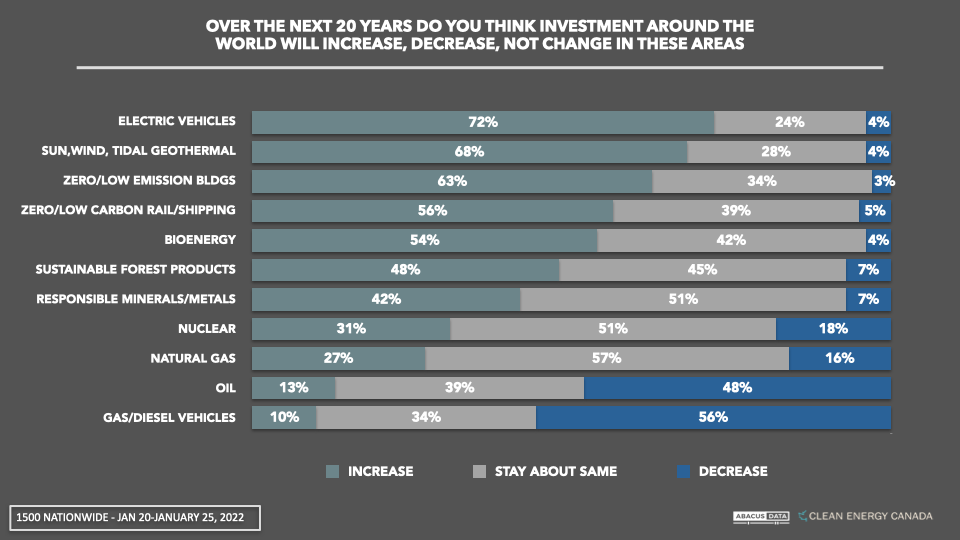
Three out of four people believe “Canada must have an ambitious strategy to be strong competitors in a global economy that is striving to reduce carbon emissions,” while 25% believe “The rest of the world economy isn’t going to change very much and we should not change too much or else we will lose jobs and competitiveness.”
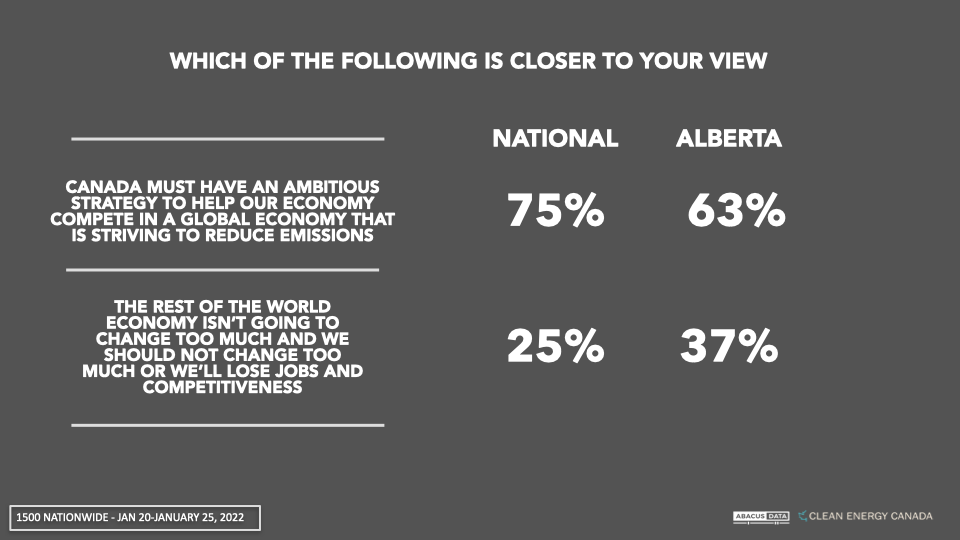
In support of a lower carbon competitiveness strategy, massive majorities support the following policy measures:
- Job retraining for workers who need to learn new skills (95% support)
- Subsidies to help companies purchase new equipment to help them reduce emissions (85%)
- Making it easier for companies to access affordable and cleaner forms of energy (92%)
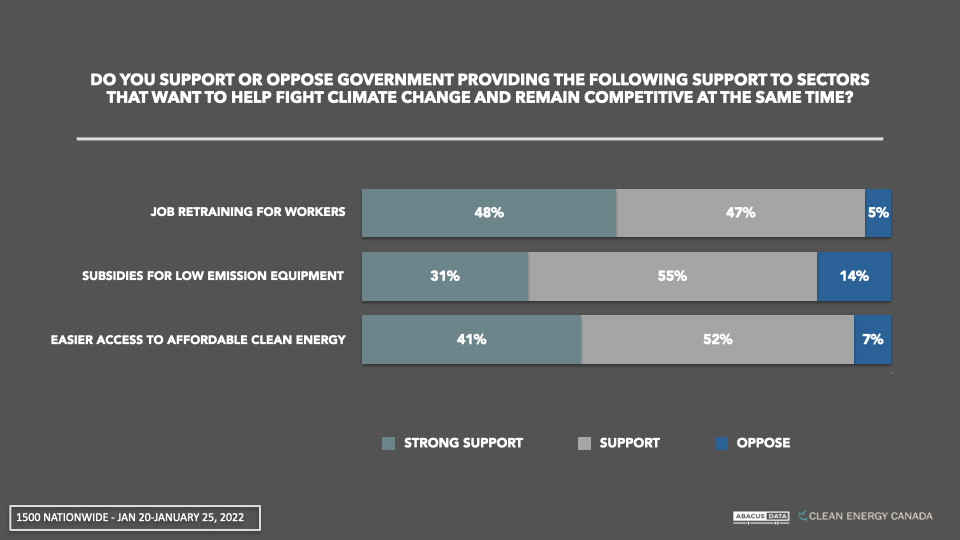
Canadians also have opinions about which sectors Canadian policy should put a priority on. Three quarters or more feel a priority should be placed on renewable energy, bioenergy, forest products, minerals and metals, low carbon buildings, low carbon shipping, and electric vehicles. Two thirds would like to see a priority on on natural gas, and opinions are split on nuclear energy and oil. However, most don’t want to see a priority on gas and diesel manufacturing.
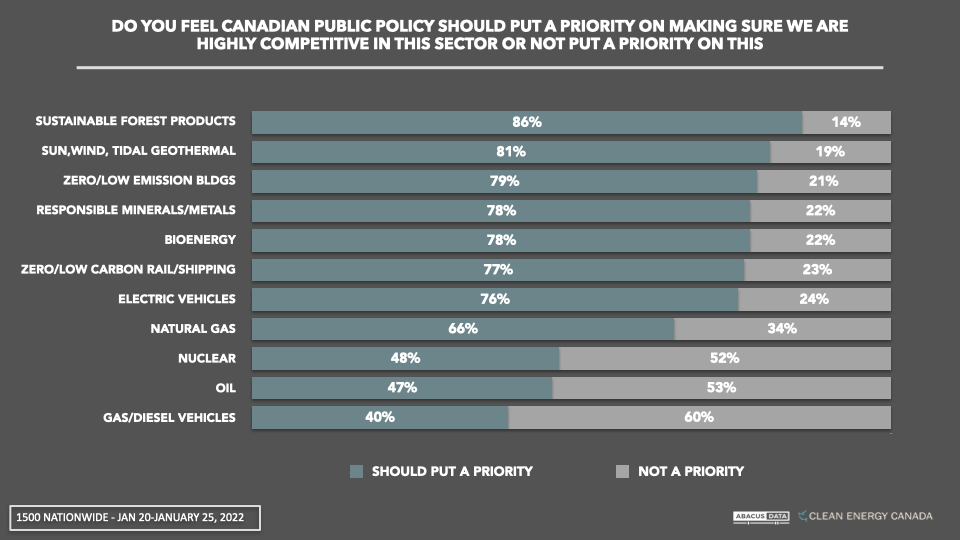
Canadians tend to think we have a good or excellent chance of being competitive in a variety of these sectors over the next 20 years, including renewable energy, sustainable forest products, responsible minerals and metals, low carbon buildings and shipping, electric vehicles, bioenergy, and natural gas. Confidence is lower when it comes to gas and diesel vehicles, oil, and nuclear energy.
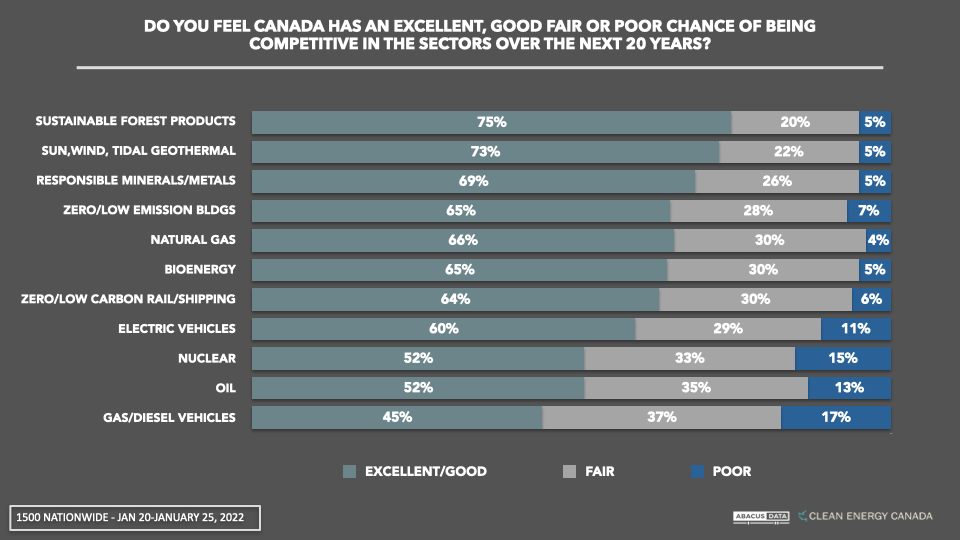
UPSHOT

According to Bruce Anderson, Chairman of Abacus Data: “One of the better ways to understand the way Canadians feel about the decarbonization challenge is to explore how they feel the world will be changing and what that should imply in terms of Canadian economic strategy. These numbers make it clear that Canadians have a view about where “the puck is going” and believe that the investments will flow to lower carbon innovations wherever possible. They both have confidence that we can succeed in this evolving global economy and want policy that helps Canada adapt and benefit from these trends, rather than avoid or ignore the trends.”
According to Trevor Melanson, Communications Director of Clean Energy Canada: “Building a sustainable economy isn’t just about producing clean energy. It’s also about the raw and manufactured materials required to build a better world—materials that go into renewable projects, electric vehicles, low-carbon buildings, and much more. The shift that’s happening globally is far bigger than any one sector, and three-quarters of Canadians now believe we must have an ambitious strategy in order to compete.”
METHODOLOGY
The survey was conducted with 1,500 Canadian adults from January 20 to 25th, 2022. A random sample of panelists were invited to complete the survey from a set of partner panels based on the Lucid exchange platform. These partners are typically double opt-in survey panels, blended to manage out potential skews in the data from a single source.
The margin of error for a comparable probability-based random sample of the same size is +/- 2.53%, 19 times out of 20.
The data were weighted according to census data to ensure that the sample matched Canada’s population according to age, gender, educational attainment, and region. Totals may not add up to 100 due to rounding.
The survey was paid for by Clean Energy Canada.
ABOUT ABACUS DATA
We are the only research and strategy firm that helps organizations respond to the disruptive risks and opportunities in a world where demographics and technology are changing more quickly than ever.
We are an innovative, fast-growing public opinion and marketing research consultancy. We use the latest technology, sound science, and deep experience to generate top-flight research-based advice to our clients. We offer global research capacity with a strong focus on customer service, attention to detail and exceptional value.
We were one of the most accurate pollsters conducting research during the 2021 Canadian election following up on our outstanding record in 2019.
Contact us with any questions.
Find out more about how we can help your organization by downloading our corporate profile and service offering.


